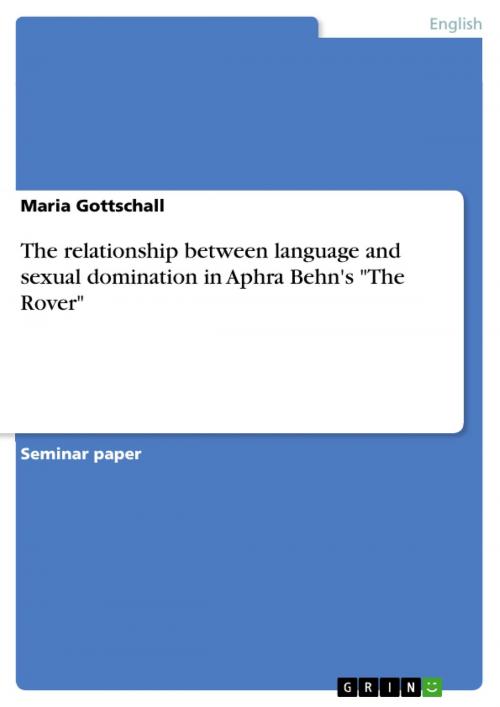The relationship between language and sexual domination in Aphra Behn's 'The Rover'
Fiction & Literature, Literary Theory & Criticism, British| Author: | Maria Gottschall | ISBN: | 9783638812597 |
| Publisher: | GRIN Verlag | Publication: | June 28, 2007 |
| Imprint: | GRIN Verlag | Language: | English |
| Author: | Maria Gottschall |
| ISBN: | 9783638812597 |
| Publisher: | GRIN Verlag |
| Publication: | June 28, 2007 |
| Imprint: | GRIN Verlag |
| Language: | English |
Seminar paper from the year 2006 in the subject English Language and Literature Studies - Literature, grade: 1,0, University of Rostock (Institut für Anglistik/ Amerikanistik), 10 entries in the bibliography, language: English, abstract: Introduction When professional actresses entered upon the English stage for the first time in 1660, their appearance marked a profound change in theatrical activity in Restoration England under Charles II. During the Protectorate (1642-1660), Charles II and his court had been in France and when they returned, French influence was brought onto the theatre stage. One of these influences was the introduction of actresses. Although women had already been acting before the Interregnum, they had done so only in the privacy of the court. Charles II, returned to England, supported the public theatre and because the 'Restoration spectators were ... exc1usively aristocratic..., favoured the court and shared its attitudes and interests', actresses were easily accepted. Thus, by 1661, actresses were a regular part of the English Restoration stage. It also became a law that exc1usively 'women should play women's parts'. Although actresses were now an accepted feature of the stage, their status within a company and within theatrical activity was still inferior to that of male actors. This inferiority included lower wages and only few roles with actua1 speaking parts. Women were rather asked to look beautiful and 'to do no more than pose... to be gazed upon and desired by male characters in the play and ... by male spectators'. In fact, the Restoration theatre aimed at attracting larger audiences by showing
Seminar paper from the year 2006 in the subject English Language and Literature Studies - Literature, grade: 1,0, University of Rostock (Institut für Anglistik/ Amerikanistik), 10 entries in the bibliography, language: English, abstract: Introduction When professional actresses entered upon the English stage for the first time in 1660, their appearance marked a profound change in theatrical activity in Restoration England under Charles II. During the Protectorate (1642-1660), Charles II and his court had been in France and when they returned, French influence was brought onto the theatre stage. One of these influences was the introduction of actresses. Although women had already been acting before the Interregnum, they had done so only in the privacy of the court. Charles II, returned to England, supported the public theatre and because the 'Restoration spectators were ... exc1usively aristocratic..., favoured the court and shared its attitudes and interests', actresses were easily accepted. Thus, by 1661, actresses were a regular part of the English Restoration stage. It also became a law that exc1usively 'women should play women's parts'. Although actresses were now an accepted feature of the stage, their status within a company and within theatrical activity was still inferior to that of male actors. This inferiority included lower wages and only few roles with actua1 speaking parts. Women were rather asked to look beautiful and 'to do no more than pose... to be gazed upon and desired by male characters in the play and ... by male spectators'. In fact, the Restoration theatre aimed at attracting larger audiences by showing















